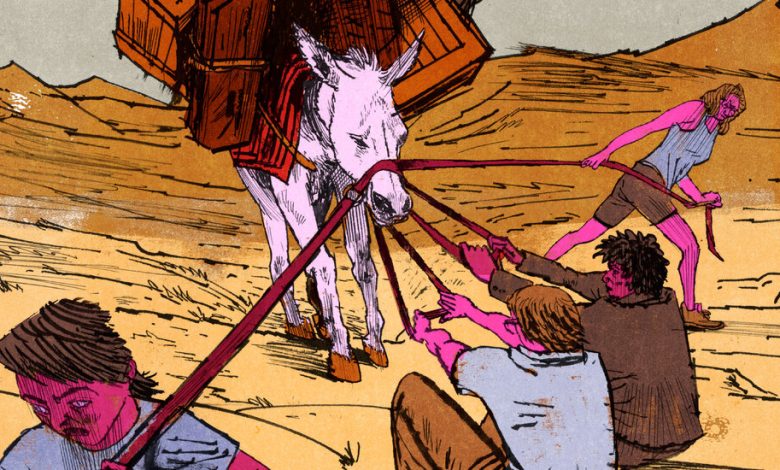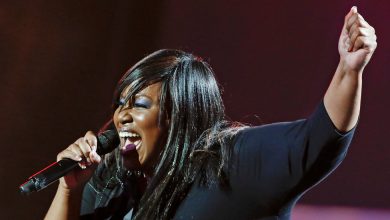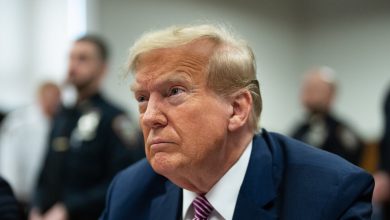Progressives Aren’t Liberal

Remember when “liberal” was a dirty word? In the 1980s, Ronald Reagan, who often prefaced it with a damning “tax and spend,” may have been the most effective of bashers. But the most blatant attack was in the early ’90s, after Newt Gingrich’s political organization GOPAC sent out a memo, “Language: A Key Mechanism of Control,” urging fellow Republicans to use the word as a slur.
It worked. Even Democrats began avoiding the dread label. In a presidential primary debate in 2007, Hillary Clinton called herself instead a “modern progressive.” She avoided the term “liberal” again in 2016.
Now the word is back. The portion of Americans who told Gallup pollsters they were “liberal” has increased from 17 percent in 1992 to 25 percent in 2021 (still lower than the proportions of those who said they were“conservatives” or “moderates”).
But the way “liberal” is being used now is more confounding than ever. Never Trump conservatives tout their bona fides as liberals in the classical, 19th century sense of the word, in part to distinguish themselves from hard-right Trumpists. Others use “liberal” and “progressive” interchangeably, even as what progressivism means in practice today is often anything but liberal — or even progressive, for that matter.
For those of us who never abandoned the term — why let Republicans define us? — liberal values, many of them products of the Enlightenment, include individual liberty, freedom of speech, scientific inquiry, separation of church and state, due process, racial equality, women’s rights, human rights and democracy.
Unlike “classical liberals” (i.e., usually conservatives), liberals do not see government as the problem, but as a means to help the people it serves. Liberals fiercely defend Social Security, Medicare, Medicaid, Obamacare, the Voting Rights Act and the National Labor Relations Act. They believe government has a duty to regulate commerce for the benefit of its citizens. They tend to be suspicious of large corporations and their tendency to thwart the interests of workers and consumers.
As recently as the 2000s, the difference between liberals and progressives was often a matter of degree — Obamacare versus Medicare for All, or increasing the top marginal tax rate versus imposing a wealth tax. But while liberalism’s most strenuous threat comes from the Trumpian right, a split over basic principles and the purpose of the left has been widening.
In an increasingly prominent version of the progressive vision, capitalism isn’t something to be regulated or balanced, but is itself the problem. White supremacy doesn’t describe an extremist fringe of racists and antisemites but is instead the inherent character of the nation.
Some aspects of contemporary progressivism look less like actual progress and more like a step in reverse. Whereas liberals hold to a vision of racial integration, progressives have increasingly supported forms of racial distinction and separation, and demanded equity in outcome rather than equality of opportunity. Whereas most liberals want to advance equality between the sexes, many progressives seem fixated on reframing gender stereotypes as “gender identity” and denying sex differences wherever they confer rights or protections expressly for women. And whereas liberals tend to aspire toward a universalist ideal, in which diverse people come together across shared interests, progressives seem increasingly wedded to an identitarian approach that emphasizes tribalism over the attainment of common ground.
More reactionary still is the repressive nature of progressive ideals around civil liberties. It is progressives — not liberals — who argue that “speech is violence” and that words cause harm. These values are the driving force behind progressive efforts to shut down public discourse, disrupt speeches, tear down posters, censor students and deplatform those with whom they disagree.
Divisions became sharper after the Oct. 7 Hamas attack, when many progressives did not just express support for the Palestinian cause but, in some cases, even defended the attacks as a response to colonialism, and opposed retaliation as a form of genocide. (One might argue that it is similarly illiberal for universities to suspend or cut funding to student groups that support Palestinian rights, as several have done, though those actions often came after chants by the groups that administrators considered threatening toward Jews.)
All this stands in marked contrast to the liberal stance that more speech is better speech, allowing for the free exchange of ideas. As David Frum, not generally considered a liberal himself, wrote recently in The Atlantic, “how is a society ever to settle its most important questions if it follows the rule ‘The more important a question, the more strictly its discussion is forbidden’?”
While progressives are not a large group (between 6 percent and 8 percent of the voting population, according to recent studies), they are likely to be the loudest on the left, and the most likely to shut out their would-be liberal allies. As Jonathan Haidt has noted, they also dominate the political conversation on social media.
In his recent book, “The Struggle for a Decent Politics: On ‘Liberal’ as an Adjective,” the political philosopher Michael Walzer writes that liberals “aspire to be open-minded, generous and tolerant.” He also notes, regretfully, “Illiberalism is more common than it should be among those who are, at least formally, members of democratic and socialist parties.”
This brings us to the most troubling characteristic of contemporary progressivism. Whereas liberals tend to pride themselves on acceptance, many progressives have applied various purity tests to others on the left, and according to one recent study on the schism between progressives and liberals, are more likely than liberals to apply public censure to divergent views. This intolerance manifests as a professed preference for avoiding others with different values, a stance entirely antithetical to liberal values.
What a strange paradox that at the very moment the word “liberal” is enjoying a renaissance, liberalism itself feels on the wane. Many liberals find themselves feeling lonelier than ever.
The Times is committed to publishing a diversity of letters to the editor. We’d like to hear what you think about this or any of our articles. Here are some tips. And here’s our email: [email protected].
Follow The New York Times Opinion section on Facebook, Twitter (@NYTopinion) and Instagram.




